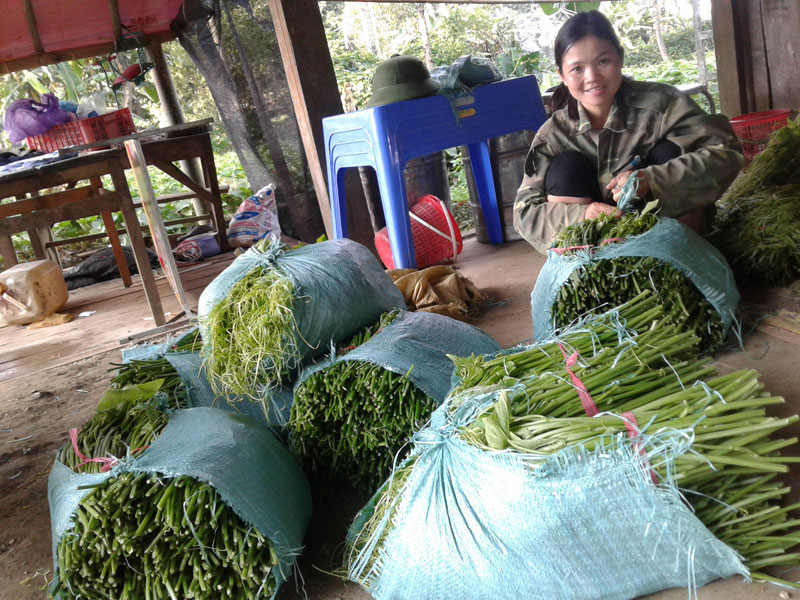
HBO – Visiting Quyet Chien commune, Tan Lac district, this time, we made an appointment with Dinh Thi Quyet, head of the Quyet Chien Cooperative. Although it was established recently, the cooperative supplies several tonnes of organic vegetables for the Hanoi and Vinh Phuc markets everyday.

Dinh Thi Quyet prepares
chayote shoots to be sold at wholesales markets in
Hanoi.
Located nearly
1,000 metres above the
sea level, the Quyet Chien commune has cool climate suitable with many kinds of
vegetables. Many years ago, several companies eyed this land to plant
vegetables and considered it a "miniature of Da Lat”.
Thanks to these advantages, over the past time, the
province’s Department of Agriculture and Rural Development and other
organisations have carried out many projects supporting the development of
organic farming of vegetables in the area. With the hope to switch to
profitable crops, Quyet and other households have actively participated in
these projects. Talking to us, Quyet said: "locals have planted forests, corns
and other food crops on this land for generations. However, these crops produce
low economic efficiency. So it is difficult for us to escape from poverty.
After being trained, I began planting vegetables on nearly 5,000sq.m of land
owned by my family. Participating in the project, we received assistance in the
form of seeds, capital and more importantly, we gained access to advanced
cultivation technologies from experts and different regions, so that we can
learn from experience and determine our own ways. Among the vegetables planted
here, chayote is the most suitable in terms of climate and cultivation
conditions and customs of mountainous residents. Chayote is easy to plant with
little care and prolonged harvest, so we have regular incomes”.
Quyet also visited wholesales markets in Hoa Binh city
and
Hanoi to
seek consumption partners. She learnt that many people liked chayote shoots and
the price remained stable. She set up direct ties with dealers at these
markets, and then purchased vegetables of locals and hired cars to transport to
dealers in
Hanoi.
Quyet said, "Along with vegetables planted on my
family’s 5,000sq.m land, I buy vegetables of villagers. When they trust in me,
they want to sell at stable volume and prices. When delivering vegetables for
distributors, the price is sometimes low due to several objective reasons, but
to maintain stable supply, I myself have to bear the loss, so that villagers feel
secured to continue their plantation”.
Sharing her experience in planting organic vegetables,
Quyet said: "unlike in other areas, in our place chayote shoots can be harvested
all the year round. As the area is surrounded by rocky mountain, we do not have
to water regularly and fertilise much. The plant also suits local soil and does
not attract pests. Therefore, the organic plantation is pretty easy”.
When the Quyet Chien cooperative was established,
Quyet was elected as its head. At that time, 30 households participated in the
cooperative with the understanding that they can only gain a firm foothold on
the market by planting clean and organic vegetables. At present, together with
chayote, the Quyet Chien cooperative also received help to farm off-season
turnip and cabbage./.
Since the beginning of this year, under the direction of the Department of Agriculture and Environment, the Sub-Department of Agricultural, Forestry, and Fishery Product Quality Management has strengthened the integration of the professional activities to promote and guide the organizations and individuals in the production and trading of agricultural, forestry, and fishery products to comply with the legal regulations regarding the use of chemicals, pesticides and veterinary medicines in crop cultivation, livestock farming and aquaculture. They also provide guidance to processing and manufacturing establishments on keeping the records to trace the product origins and using food additives from the approved list according to the regulations.
Hoa Binh province saw a significant rise in state budget revenue in the first two months of 2025, heard a meeting chaired by Vice Chairman of the provincial People’s Committee Quach Tat Liem.
Ha Thi Ha Chi, a 26-year-old graduate in law, has taken an unconventional path by returning to her hometown in Mai Chau district to establish the Tong Dau Cooperative, creating stable jobs for local women and bringing Thai ethnic brocade weaving to the global market.
As the Lunar New Year 2025 approached, pork prices surged, creating a profitable season for farmers in Tan Vinh commune, Luong Son district. Taking advantage of the rising demand, Can Minh Son, a farmer from Coi hamlet, sold over 30 pigs at 69,000 VND/kg, each weighing more than 100 kg. After deducting expenses, his family earned a profit of over 50 million VND.
alternate member of the Central Party Committee, Secretary of the Hoa Binh provincial Party Committee Nguyen Phi Long on March 5 had a working session with Yan Jiehe, Founder and Chairman of the China Pacific Construction Group, one of China's largest private corporations in the field of transport infrastructure. Deputy Secretary of the provincial Party Committee, Chairman of the provincial People's Committee Bui Duc Hinh and leaders of provincial departments and sectors also attended the working session.
The electronic printed circuit board (PCB) manufacturing and processing plant of Japan’s Meiko Group, located at Da River Left Bank Industrial Park in Hoa Binh city with a total investment of over 200 million USD, is expected to create thousands of jobs and make a significant contribution to the local budget.



